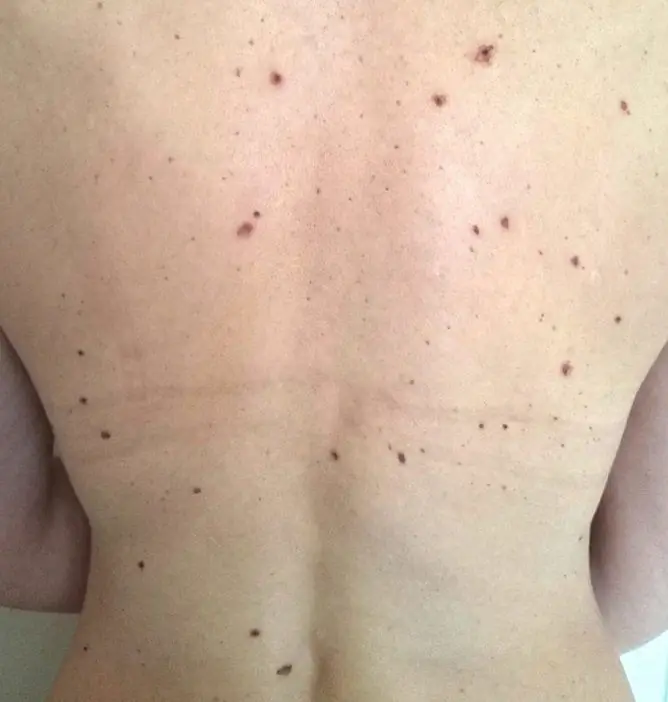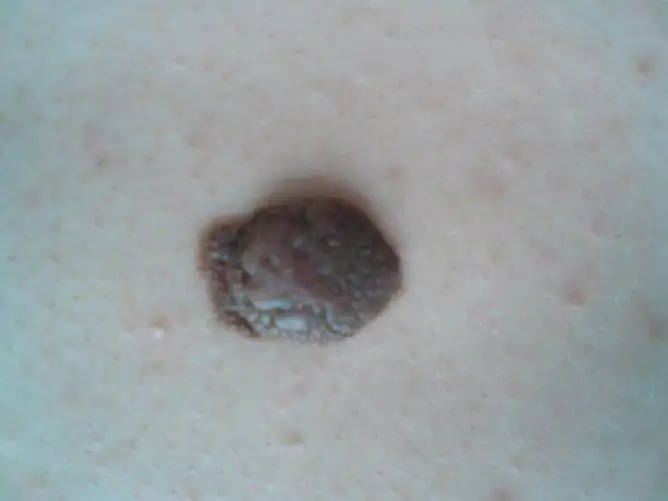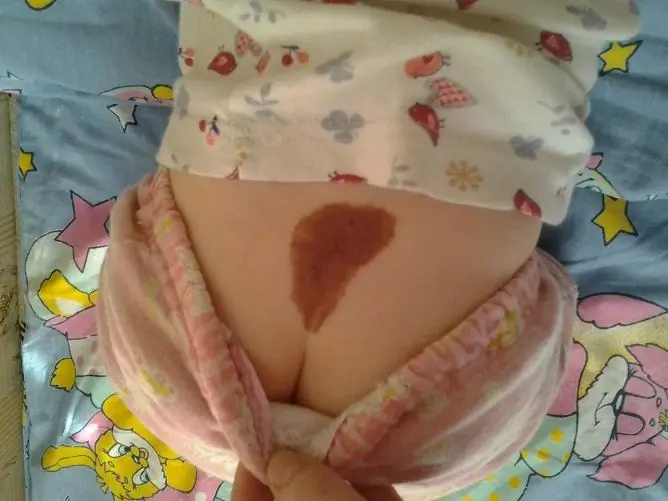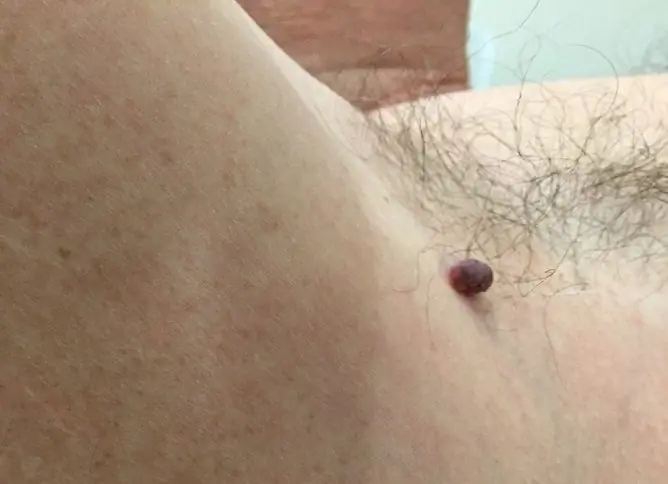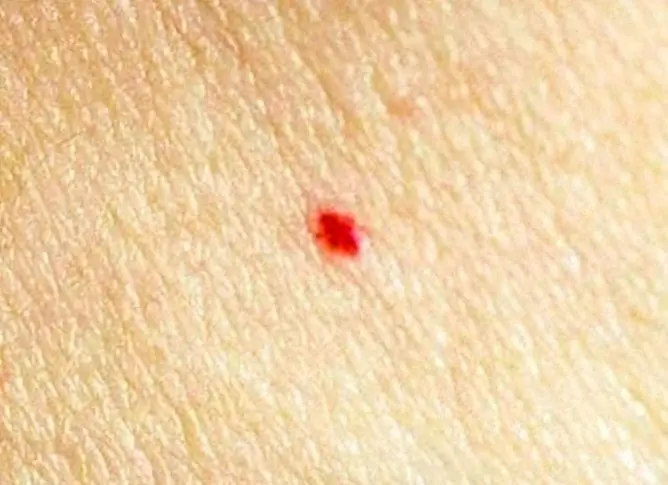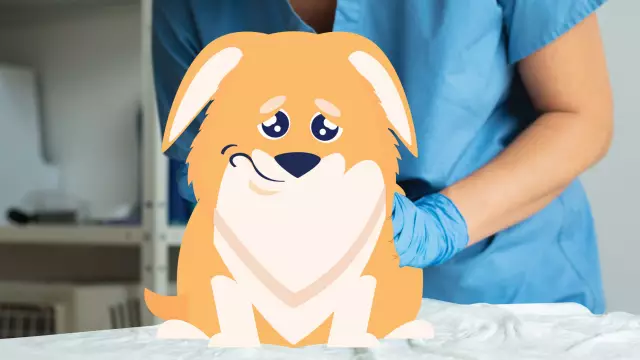- Author Rachel Wainwright wainwright@abchealthonline.com.
- Public 2024-01-15 19:51.
- Last modified 2025-11-02 20:14.
Many moles on the body
The content of the article:
- Why did many moles appear on the body in a short time?
- Many large and small moles on the body: is it dangerous
-
The number of large moles on the body increases: what to do
- At home
- When to see a doctor
- Is it worth removing nevi
- Video
A mole (birthmark, nevus) is a benign neoplasm that almost every person has. Some have only a few of them on their bodies, while others have more than 100. Many moles on the body are a reason for self-examination and regular visits to a doctor, but not for panic.

Many moles on the body
Why did many moles appear on the body in a short time?
A pigmented mole is a collection of melanocytes (cells that produce the pigment melanin) in the epidermis or dermis. This process is regulated by melanocyte-stimulating hormones, which are produced in the intermediate lobe of the pituitary gland. It is mainly heredity that determines the number of moles on the human body. At certain gene loci, information is laid on the number and localization of all formations on the skin.
The appearance of new formations can be associated with the influence of many factors - hormones, ultraviolet radiation, infections, trauma.
| Cause | What does this mean |
| Hormonal imbalance |
The increase in the number of nevi may be associated with hormonal changes. For example, this is often observed in puberty, due to a sharp increase in the production of sex hormones. Many small moles can appear in a woman during pregnancy. This is a normal reaction of the body and does not pose a danger to human life. Less often, endocrine pathology associated with a violation of the production of pituitary hormones can provoke the appearance of new formations. |
| Ultraviolet radiation |
The growth of melanocytes occurs under the influence of ultraviolet radiation; with increased insolation, moles may become larger. Thus, prolonged exposure to direct sunlight, frequent visits to the solarium can be hazardous to human health. |
| Skin trauma and infections | Sometimes, many moles appear in response to trauma or viral infection. Biologically active substances that are formed during inflammation can stimulate the growth of melanocytes. |
Many large and small moles on the body: is it dangerous
New moles can appear anywhere: face, scalp, abdomen, back, arms, legs. Their color can also be different - brown, black, red, purple. The shape can be flat, spotted, or convex. These characteristics have little effect on the risk of melanoma. Only the quantity matters, as well as the so-called. hazard criteria - asymmetry, edge, color, size and dynamics.
| Criterion | What does it mean, normal performance | Changes that cause concern |
| Symmetry |
To assess the symmetry, it is necessary to draw a conditional line along the center of the nevus. If the halves are roughly the same, that's a good sign. |
Asymmetry of the halves. |
| Edge | Clear boundaries of the nevus are considered normal. The edge should normally be flat, smooth. | Fuzzy and blurred edges, jags, irregularities. |
| Coloration | It is not the color of the nevus that is evaluated, but the uniformity of color. It is good if the color is uniform, without areas of enlightenment or darkening. | Uneven color - there are lighter and darker gaps, inclusions. |
| The size | Small formations are considered prognostically more favorable. | The diameter of the neoplasm is more than 6 mm. |
| Development dynamics | It is very important to monitor the dynamics of neoplasms - how quickly they grow, whether the color or surface changes. | Increase in size in a short period of time. Discomfort (itching, pain, skin numbness). |
A large number of birthmarks is associated with an increased risk of developing melanoma, a malignant neoplasm of the skin. If there are more than 100 moles on the body, the risk of malignancy increases 5 times.
To roughly determine the number of formations on the body, you need to calculate how many moles are located on one arm (hand, forearm, shoulder). If there are more than 7 of them, most likely the total number of nevi is more than 100.
The number of large moles on the body increases: what to do
Question: what to do if large moles constantly appear? The first thing to do if many birthmarks appear on the body is to examine the skin and evaluate the symmetry, edge, color and size of the neoplasms.
If moles appear in large numbers, a medical examination is necessary anyway.
At home
The main thing to do at home is to regularly inspect new formations. In most cases, this is sufficient to prevent complications. There is no need to try to get rid of birthmarks with the help of medicines or folk remedies, this can be bad for your health.
A few important tips for skin care:
- Avoid direct sunlight on your skin (it is not recommended to sunbathe between 11 and 16 hours).
- Use a sunscreen - it is better to choose a cream with a protection factor of at least 15 (SPF 15).
- Cover large sun spots with a bandage.
- Do not comb or injure the formation.
- Do not use peels on skin areas with nevi.
When to see a doctor
In addition to a large number of formations on the body, risk factors include:
- male sex (men are more at risk of developing melanoma);
- age over 50 (melanoma develops more often in adults);
- fair skin and hair, freckles;
- sun-sensitive skin (such people often burn in the sun);
- aggravated heredity - one of the close relatives was diagnosed with melanoma.
People who are at risk should see a doctor at least once a year. Also, you need to consult a doctor if any criterion of danger appears (asymmetry, uneven edges, rapid growth, uneven color).
Is it worth removing nevi
Not all formations on the skin can be removed. It is necessary to decide whether or not to remove a mole after consulting a dermatologist, including a dermatoscopy.
When education is to be removed:
- there are signs of malignant transformation;
- often injured;
- creates discomfort;
- localized on the face (cosmetic defect).
The rest of the nevi are only observed, it is not necessary to remove them.

Whether it is necessary to remove moles, or there is no need for this, the doctor will determine after the examination
Several methods can be used for treatment: electrocautery, cryotherapy, surgical excision, laser therapy.
| Removal method | How it goes, what is | What formations can be removed | Advantages and disadvantages |
| Electrocoagulation | The method is based on the action of an electric current. A special instrument (coagulator) is used to cauterize the nevus. The procedure is performed under local anesthesia. | Only benign, small and medium | The advantages include the minimally invasiveness of the method and its availability. The main disadvantage is that you cannot remove melanoma. A scar may remain on the skin. |
| Cryotherapy | During cryodestruction, liquid nitrogen is used to remove the nevus. It is frozen and destroyed. A bubble forms at the site of exposure to liquid nitrogen, and after its opening, a crust forms. | Small benign lesions | Advantages: painlessness, minimally invasiveness. The disadvantage is that several sessions are often required; large nevi cannot be removed. |
| Surgical excision | Using a scalpel, the surgeon removes the formation, sutures the wound, and sends the material for histological examination. | Any | Advantages: you can remove any formations, even malignant ones. Disadvantages: the method is traumatic, after the operation a scar remains. |
| Laser therapy | The procedure is performed under local anesthesia, and the mass is removed with a laser. | Only benign, small and medium | Advantage - no scar remains after removal. Disadvantages - high cost, inability to remove malignant neoplasms. |
Video
We offer for viewing a video on the topic of the article.

Anna Kozlova Medical journalist About the author
Education: Rostov State Medical University, specialty "General Medicine".
Found a mistake in the text? Select it and press Ctrl + Enter.

